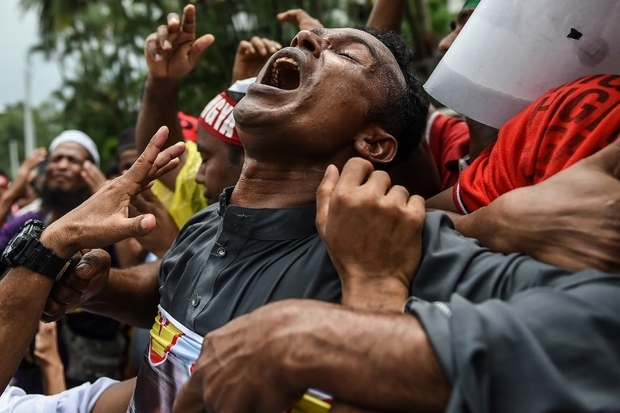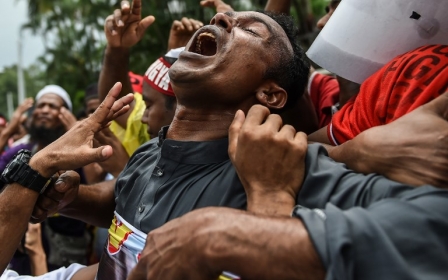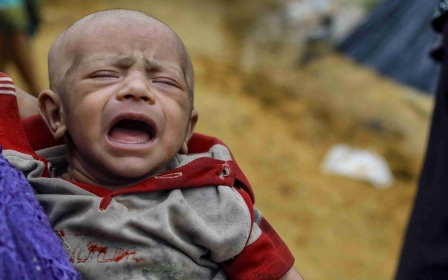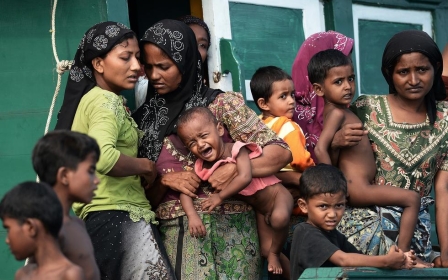The world must end its soft approach on Myanmar
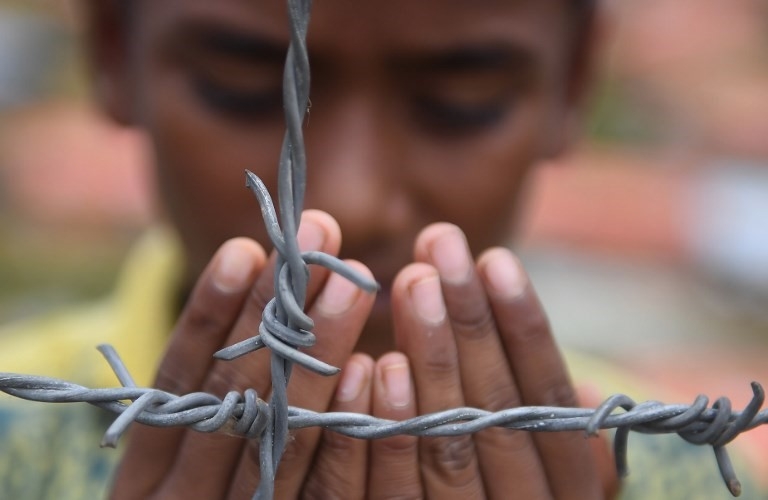
On Monday, a UN fact-finding mission concluded that top generals in the Burmese military must face accountability for genocide, crimes against humanity and war crimes against ethnic Rohingya, Kachin and Shan minorities.
Just over a year ago today, a commission on Rakhine set up under the late UN secretary general, Kofi Annan, issued a set of recommendations to address the persecution of the Rohingya minority. The following day, rather than accepting the recommendations, the Burmese military went on its biggest killing spree against the Rohingya in recent history.
Crimes against humanity
In a brutal crackdown, the Burmese army shot, burned and beat to death more than 10,000 Rohingya, including at least 730 children under the age of five (some plucked from their mothers' arms), in the first month of the crackdown, and forced more than 700,000 to flee Rakhine state in western Myanmar. According to a ASEAN Parliamentarians for Human Rights report, more than 43,000 Rohingya parents are missing and 28,300 Rohingya children have become orphans.
These acts amount to crimes against humanity and, in the words of the UN human rights chief, Zeid Ra'ad al-Hussein, are a "textbook example of ethnic cleansing". In response to the International Criminal Court's request for jurisdiction to investigate these crimes, Myanmar has rejected the case, calling it "meritless".
While the world said 'never again' after Rwanda and Srebrenica, the international community appears to be lacking the political will to hold Myanmar accountable for crimes against one of the world’s most persecuted minorities
While the world said 'never again' after Rwanda and Srebrenica, the international community appears to be lacking the political will to hold Myanmar accountable for crimes against one of the most persecuted minorities on the planet. Since last year's brutal crimes against the Rohingya, little has been done by the international community to put pressure on the regime.
Continuing to ignore this ethnic cleansing perpetuates the same mistakes the international community has made in the past. Accountability is needed, rather than continuing on the current path, as the situation worsens every day for the Rohingya.
Demonisation and persecution
While many in the international community held great hope for reform in Myanmar, the reality has sunk in that the military has only solidified its power. As the world continued to invest itself in guiding Myanmar along to becoming a freer and more prosperous nation, they have instead found themselves enriching its generals while ignoring the worsening demonisation and persecution of the Rohingya minority, which has resulted in mass killings, gang-rapes and mass displacement.
The same callous inaction that caused the events of 25 August 2017 must not be allowed to continue.
Following decades of attacks by the military, anti-Muslim riots and the steady degradation of rights, the Rohingya are now suffering more than any time before in their history. More than a million Rohingya have been displaced from Myanmar, with more than 723,000 forced out just this past year.
Compounding the issue is a memorandum of understanding between UN agencies and Myanmar regarding the repatriation of the 1.1 million Rohingya living as refugees in Bangladesh. The secret document, which was leaked to the press, offers no solid assurances for the safety, freedom of movement, human rights or citizenship rights of the Rohingya who would return. It was signed while several serious issues remain unaddressed for the Rohingya who are still living in Myanmar, let alone for those who return. Human Rights Watch reported that Rohingya returnees are facing torture and imprisonment by Burmese security forces.
Horrendous human rights abuses
More than 120,000 Rohingya have languished in squalid camps for the displaced since 2012. The push to encourage them to return would expose them to horrendous human rights abuses. The Rohingya who stayed in northern Rakhine state following the violence in August 2017 have faced severe shortages of aid and restrictions on travel prohibiting them from seeking food or work to feed their families.
The Rohingya living on the Myanmar side of the Bangladesh border have been victims of persistent abuse from the security forces, including an 11-year-old boy who was shot on 28 June, just hours after discussions were held between Bangladeshi and Burmese border agencies regarding the return of those Rohingya living in the area. Despite this, the international community pushes for the return of those Rohingya living in Bangladesh.
The international community has sent the wrong signal to the Burmese military, who feel free to continue carrying out human rights violations in Rakhine state and elsewhere in the country
Myanmar must be held accountable for the crimes against humanity the military has committed against the Rohingya. Putting international pressure on the regime may not ensure immediate justice for the victims, but it would help prevent further atrocities as the regime would know that the world is watching.
Tragically, the international community has sent the wrong signal to the Burmese military, who feel free to continue carrying out human rights violations in Rakhine state and elsewhere in the country. By failing to take effective action against the perpetrators, more innocent lives will be risked in the future as Kachin and Shan people are facing atrocities while the world is focusing on Rohingya issue.
Lack of serious opposition
It is imperative that steps to prosecute the perpetrators at the International Criminal Court be supported strongly by those countries that have the power to make the difference, particularly the UK, which has a historical relationship with Myanmar.
Emboldened by lack of serious international opposition, the Burmese military continues to commit ethnic cleansing against the Rohingya civilian population. It is time for the international community to reconsider its soft approach towards Myanmar and adopt a more assertive strategy.
As Zeid Ra'ad al-Hussein cautioned in his speech to the Human Rights Council in June: "If a member state of this organisation can force out 700,000 people in almost three weeks, with practically minimal response by the international community, then how many others in this chamber are beginning to entertain something similar?” The world would do well to heed his warning.
- Kyaw Win is a UK-based human rights activist. He was born and raised in Rangoon. In 2012 he founded the Burma Human Rights Network (BHRN) in London. As the executive director of BHRN, he leads several different teams inside Myanmar who are documenting human rights violations.
The views expressed in this article belong to the author and do not necessarily reflect the editorial policy of Middle East Eye.
Photo: A Rohingya refugee in Kutupalong refugee camp in Cox's Bazar, Bangladesh attends a ceremony on the first anniversary of the military crackdown on the Rohingya (AFP)
This article is available in French on Middle East Eye French edition.
New MEE newsletter: Jerusalem Dispatch
Sign up to get the latest insights and analysis on Israel-Palestine, alongside Turkey Unpacked and other MEE newsletters
Middle East Eye delivers independent and unrivalled coverage and analysis of the Middle East, North Africa and beyond. To learn more about republishing this content and the associated fees, please fill out this form. More about MEE can be found here.



